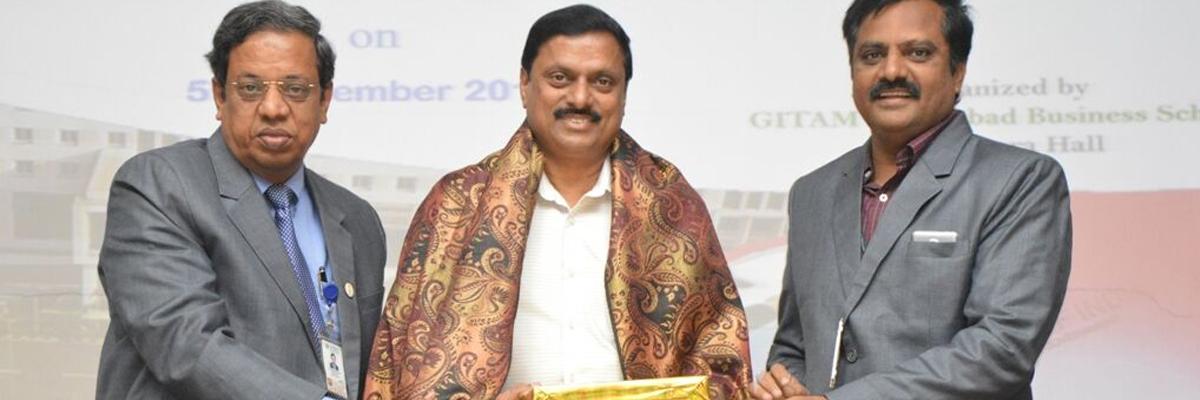Live
- Ahsaas Channaopens up about her complex character in ‘Mismatched 3’
- Radhika Apte welcomes first child, shares heartfelt post
- Jacqueline dazzles at Da-Bangg Reloaded concert
- Time to boost measures to prevent drowning, save children: WHO
- TDP achieves milestone with 73 lakhs membership registration, says Chandrababu
- South Korea: Main Oppn hails Yoon's impeachment motion passage as 'victory for people, democracy'
- RG Kar issue: Tension flared over parallel protests by Congress, SUCI(C) outside CBI offices
- After furore, Central Railway revokes order to raze Lord Hanuman Temple at Dadar
- Now hoteliers' body in Bengal's Alipurduar shut doors for Bangladeshi tourists
- District Collector Encourages Students to Utilize Government Facilities for a Better Future
Just In

Indian Economy is treading a dangerous path in propping up equity markets, weakening the public banking sector and in not showing real growth through employment generation, warned the speakers at the Conclave on the Indian Economy Present Status and the Road Ahead, organised by GITAM Hyderabad Business School GHBS on Wednesday
Hyderabad: “Indian Economy is treading a dangerous path in propping up equity markets, weakening the public banking sector and in not showing real growth through employment generation”, warned the speakers at the “Conclave on the Indian Economy: Present Status and the Road Ahead”, organised by GITAM Hyderabad Business School (GHBS) on Wednesday.
D Papa Rao, independent analyst, in his address, showed how the Indian economy, which was once immune to global economic crisis, is increasingly becoming susceptible to the economic turbulences abroad. ‘Even in 2008, when there was a global crisis with the crumbling of Wall Street banks, we were relatively safe because of robust nationalised banking sectors and stability in the purchasing power of our citizens’ he said.
‘However, since 2011, we have been importing not only more goods but also crises. As of now the growth rate is alarmingly low. Unemployment is increasing. Swadeshi slogan was a failure as the indigenous companies are being sold out to foreign companies, which is being touted as coming in of FDI. We need to regain the glory that was India before 1820s, when the growth rate of Indian and China far exceeded that of the western countries’ he affirmed.
S Ananth, columnist and financial analyst, spoke on how financial markets are increasingly turning hostile to small investors as the financial data became very expensive. They also became more dependent on the trends in the international markets. Increasing use of Artificial Intelligence and algorithms has resulted in high frequency trading with little human intervention. ‘With two big deficiencies, of capital, and of oil, we are dependent on foreign inflows. But since what is flowing in is foreign portfolio investment, which is very volatile, rather than foreign direct investment that is more stable, we are more affected by global crises’ he opined. Ananth advised students to acquire more of the intangible asset called knowledge to be of relevance in the new economy.
In his presentation, B S Rambabu, National Secretary, All India Bank Employees Association dwelt on the crisis in the banking sector. ‘The public banking sector which made enormous contributions to the real growth of economy and the standard of living of the citizens is now being blamed for its inefficiency and its growing list of non-performing assets (NPAs). Our economic policies have helped only a few individuals but not the majority of our population and especially the younger generation. Economic issues have become political issues. Political system is supporting corporate looters’ he declared. Citing examples of Vijay Mallya and Nirav Modi, he said such instances of defrauding of banks is a result of lack of political will in our government machinery and of stringent law.
Earlier, U Devi Prasad, Coordinator of the Conclave, welcomed the resource persons and laid out the objective of the conclave, which is to facilitate reflection on current economic issues, and to connect them with theory studied in classrooms.
Y Lakshman Kumar, Dean & Director, GITAM HBS, in his address, flagged issues puzzling students and the general public, such as rupee depreciation, the impact of GST, and hoped that the discussions in the conclave would point out towards a way out of the volatility plaguing the Indian economy. In the question-answer session, the resource persons addressed queries and concerns raised by the students and the faculty about the immediate future of our economy, equity markets, digital economy, corporate ethics, and crypto currency. D V V S R Varma, Resident Director, GITAM Hyderabad Campus, Prof A Sriram, Director, Student Affairs, heads of GITAM Hyderabad institutions, faculty and students participated in the Conclave.

© 2024 Hyderabad Media House Limited/The Hans India. All rights reserved. Powered by hocalwire.com







